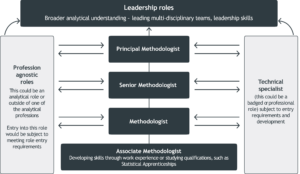Role profile: methodologist
Methodologists are methods experts in areas such as:
- time series
- sample design
- modelling
- analysis
- quality
- statistical computing
- harmonisation
- questionnaire design
Methodologists design all steps needed to do a survey from population of interest, sample, mode for survey and contact, and elements of data collection. They do this alongside designing questionnaires and working out how results will be weighted and analysed.
This is a technically specialist role. Methodologists need strong statistical and data analysis skills. They are usually members of the Government Statistical Service (GSS) profession or the Government Social Research (GSR) profession.
Typical role responsibilities
Methodologists:
- work on a range of well-defined research projects
- apply relevant social research or statistical skills, knowledge and judgement to do analysis, investigate options, and develop and improve data collection methods
- work closely with their customers to communicate findings – this often includes giving presentations and writing reports
- work as part of teams that specialise in investigating and developing data collection tools and techniques – they also work as part of other multi-disciplinary teams on specified projects
- organise and produce a programme of different projects for a variety of stakeholders – this includes working out their needs, and supporting them both proactively and at short-notice with unexpected requests
Senior roles may include leadership of a team.
Skills
There are several important skills that methodologists need to be successful in their role.
Find out more about skill level definitions.
You must have a broad mathematical and statistical awareness. You must also be able to develop expertise in specialised areas of statistical methodology and its application.
You will be expected to demonstrate these skills at different levels depending on the seniority of your role.
Associate methodologist
As an associate methodologist, you must have an ‘awareness’ skill level.
Methodologist
As a methodologist, you must have a ‘practitioner’ skill level.
Senior methodologist
As a senior methodologist, you must have an ‘expert’ skill level.
Principal methodologist
As a principal methodologist, you must have an ‘expert’ skill level.
You must be able to use research methods to investigate and understand complex methodological problems and processes. You must also be able to use these methods to make sensible decisions in areas of expertise. This includes thinking about likely outcomes and future, strategic needs.
You must be able to advise on related matters, and guide others when evaluating the effects of methodological choices.
You will be expected to demonstrate these skills at different levels depending on the seniority of your role.
Associate methodologist
As an associate methodologist, you must have an ‘awareness’ skill level.
Methodologist
As a methodologist, you must have a ‘practitioner’ skill level.
Senior methodologist
As a senior methodologist, you must have an ‘expert’ skill level.
Principal methodologist
As a principal methodologist, you must have an ‘expert’ skill level.
You must have an aptitude for statistical computing, or ‘programming’. You must also be able to learn new programming languages.
You will be expected to demonstrate these skills at different levels depending on the seniority of your role.
Associate methodologist
As an associate methodologist, you must have an ‘awareness’ skill level.
Methodologist
As a methodologist, you must have a ‘working’ skill level.
Senior methodologist
As a senior methodologist, you must have a ‘practitioner’ skill level.
Principal methodologist
As a principal methodologist, you must have an ‘expert’ skill level.
You must have strong verbal and written communication skills. You must be able to present statistical results in a range of formats to different audiences.
You will be expected to demonstrate these skills at different levels depending on the seniority of your role.
Associate methodologist
As an associate methodologist, you must have an ‘awareness’ skill level.
Methodologist
As a methodologist, you must have a ‘working’ skill level.
Senior methodologist
As a senior methodologist, you must have a ‘practitioner’ skill level.
Principal methodologist
As a principal methodologist, you must have an ‘expert’ skill level.
You must be able to working with stakeholders to gather requirements. You must also be able to act as a subject matter expert.
You will be expected to demonstrate these skills at different levels depending on the seniority of your role.
Associate methodologist
As an associate methodologist, you must have an ‘awareness’ skill level.
Methodologist
As a methodologist, you must have a ‘working’ skill level.
Senior methodologist
As a senior methodologist, you must have a ‘practitioner’ skill level.
Principal methodologist
As a principal methodologist, you must have an ‘expert’ skill level.
Sample career path
The methodologist career path shows some of the common entry and exit points for the role. It also shows the typical skill levels needed.
You can enter a methodologist role from another analytical profession, or from other professions. You can also exit the role to join another profession.

The diagram shows a potential career path. It shows that you can enter or leave a role from a wide range of backgrounds and experience levels. For example, you could become a methodologist by developing your skills in an associate role. You could continue to move up the levels in the career path by taking on more senior methodologist roles. Or you could develop your skills by working in a technical specialist role in an analytical or digital profession. You could also develop the necessary skills by working in a profession agnostic role outside of these professions.
A role that could be done by any person with the relevant skills or experience from any profession.
This could be a ‘badged’ or professional role that is subject to entry requirements and development.
Beyond the principal methodologist role, you could go into more senior leadership roles. These roles require broader analytical understanding, and the ability to lead multi-disciplinary teams.
